When will the new framework come into effect?
The new framework will be rolled out starting in November 2023 in the South network and gradually extended to other geographical networks (including London and the rest of England) by March 2024. The CQC will notify each provider when it’s their time to transition to the new portal, so ensure that your organization’s contact details are up to date. The existing regulatory approach will continue in areas where the single assessment framework has not yet been implemented.
When is the new provider portal going live?
The new provider portal will be introduced and progressively implemented starting in August 2023, with a full rollout expected by March 2024. In August, 230 providers will receive invitations to join the portal, with additional invitations sent out in September.
Will the KLOEs and promos remain in place?
Ratings such as Outstanding, Good, Requires Improvement, and Inadequate, as well as the five key questions (Safe, Effective, Caring, Responsive, and Well-led), will still be utilized. However, the key lines of enquiry (KLOEs), prompts, and ratings characteristics will be substituted with quality statements that focus on specific topic areas under each key question.
How does the Provider Information Return (PIR) align with the new portal?
The CQC emphasizes the importance of the PIR as a key element of their information gathering process. The new portal streamlines the data collection process from various sources and stakeholders, including care providers, NHS England, and Local Authorities. The goal is to eliminate the need for the lengthier PIR form in the future. Providers will also have access to this information to offer a more real-time view of their performance, aiding in determining the inspection outcome.
Who will the new framework apply to?
The CQC’s new assessment framework will be applicable to providers, local authorities, and integrated care systems.
How will this impact my CQC rating?
Each aspect of the new assessment methodology may lead to changes in your rating. The CQC aims to update the information they hold about a service, including all required quality statements and evidence categories, within a two-year timeframe.
What can we expect from inspections?
While inspections will remain a vital part of CQC assessments, the new regulatory model indicates that the CQC will conduct an ongoing assessment of quality and risk. This means that inspections will not be the sole method of assessing your service. The CQC will collect evidence from six categories, including people’s experiences with health and care services, feedback from staff and leaders, input from partners, observations, processes, and outcomes, to make informed decisions about your service.
If you’d like to learn more about our software solutions for community care can help, please book a call with our team


Recent Comments